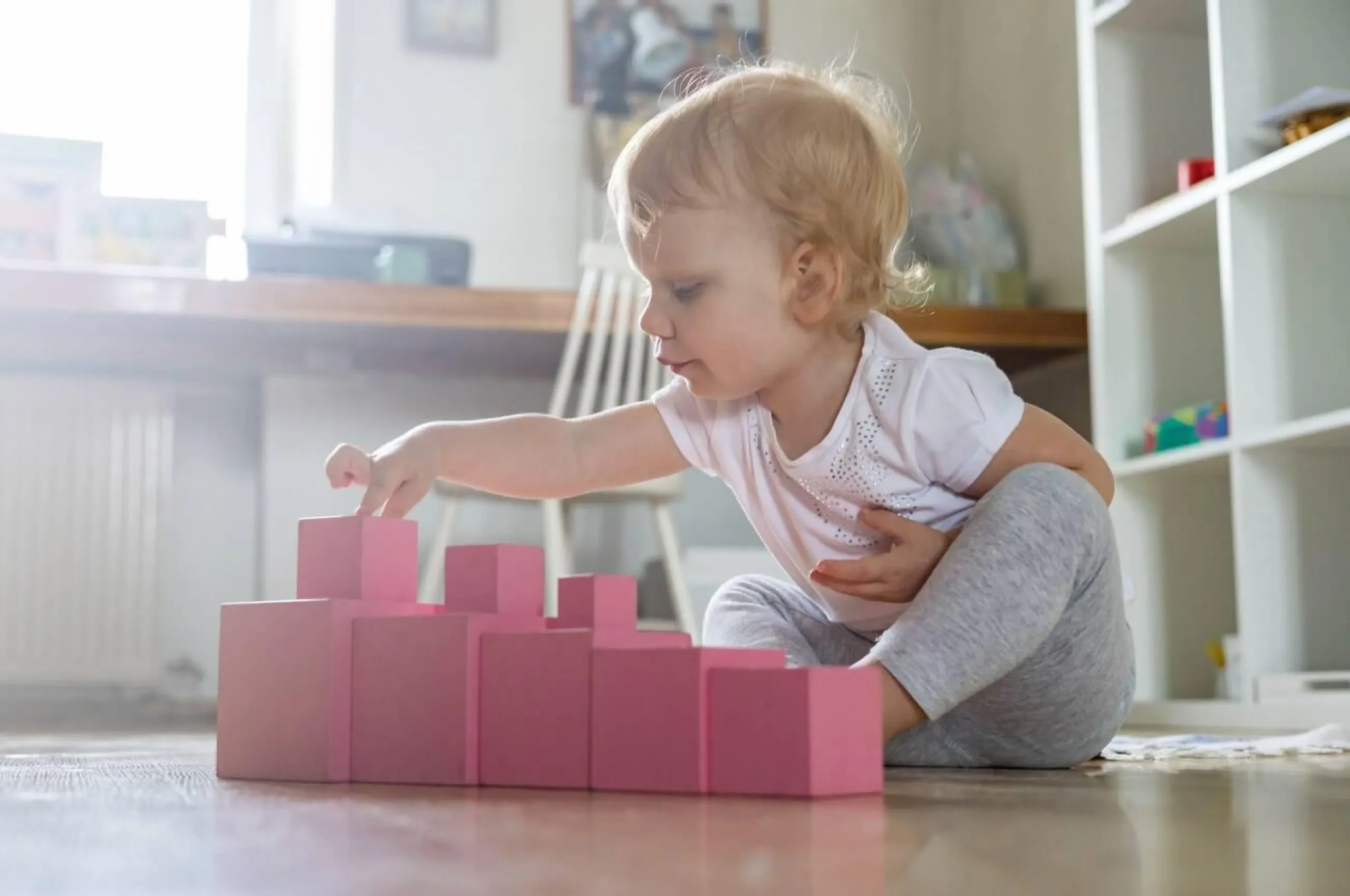Montessori education recognizes the profound potential within each child and provides a nurturing environment for growth and development through carefully designed stages. But at what age does this journey begin, and how does it unfold? Let’s embark on a guided tour through the five stages of Montessori education, unveiling the unique experiences and benefits that await your child at each turn.
Table of Contents – Ideal Age For Montessori School
What Age for Montessori School? – A Quick Answer
The ideal age to enroll a child in a Montessori school is between 2.5 and 6 years old. This is when children are most sensitive to the world around them and can benefit the most from the Montessori educational approach.
Montessori schools are typically designed for children aged 2-6 years old, although some schools offer programs for younger and older children. The Montessori Elementary curriculum is for children ages six through nine, building on the Children’s House curriculum.
While Montessori education is available up to secondary education, the most popular age range to begin is between 2.5 to 6 years old. The Montessori method is based on the belief that young children are naturally curious and learn best through hands-on learning and a collaborative environment.
Stage 1: Nido (Birth to 3 Years)

The Nido, meaning “nest” in Italian, is a sanctuary for the earliest explorers. In this warm and welcoming space, infants and toddlers experience a world designed around their sensory development and burgeoning independence.
Fostering Foundations:
- Sensorial Exploration: Every moment is an opportunity for sensory exploration, with activities and materials designed to engage sight, touch, taste, smell, and sound.
- Movement and Coordination: Crawling, climbing, grasping, and manipulating objects refine gross and fine motor skills, laying the groundwork for future learning.
- Language Acquisition: A rich environment filled with songs, stories, and everyday interactions nurtures a natural love for language and lays the foundation for communication.
- Emotional Security: Nido teachers act as gentle guides, ensuring emotional security and promoting self-regulation through warm and responsive care.
Stage 2: Casa dei Bambini (3 to 6 Years)

The Casa dei Bambini, or “Children’s House,” is where the spirit of independence truly ignites. This carefully prepared environment invites children to engage in self-directed learning, mastering practical life skills, and exploring academic concepts at their own pace.
Blossoming Independence:
- Practical Life Skills: Children learn to care for themselves and their environment through activities like washing dishes, buttoning clothes, and pouring water, fostering self-reliance and confidence.
- Sensorial Refinement: Sensory materials continue to play a pivotal role, deepening understanding of the world through activities like smelling different fragrances, sorting objects by texture, and listening to varied sounds.
- Math and Language Exploration: Children learn number concepts through hands-on manipulatives and develop literacy skills through storytelling, writing, and reading, all at their own pace and interest.
- Social and Emotional Development: Collaborative play, conflict resolution, and empathy flourish in the mixed-age environment, laying the foundation for strong social and emotional skills.
Stage 3: Lower Elementary (6 to 9 Years)
The Lower Elementary marks a period of intellectual curiosity and critical thinking. Children delve deeper into academic subjects, expanding their knowledge of the world through research, collaboration, and hands-on projects.

Expanding Horizons:
- Integrated Curriculum: Math, science, language arts, and history are explored as interconnected concepts, fostering a holistic understanding of the world.
- Abstract Thinking: Children learn to analyze, synthesize, and draw conclusions, developing critical thinking and problem-solving skills.
- Research and Presentations: Research projects and presentations encourage independent learning, collaboration, and effective communication.
- Community Engagement: Field trips and service projects connect children to the wider community, fostering global awareness and social responsibility.
Stage 4: Upper Elementary (9 to 12 Years)

Upper Elementary students refine their academic skills while developing a strong sense of self and social responsibility. This stage fosters intellectual curiosity, ethical reasoning, and a dedication to making a positive impact on the world.
Refining and Shaping:
- Abstract Concepts and Depth of Knowledge: Students engage with complex academic concepts and delve deeper into areas of personal interest.
- Critical Thinking and Reasoning: Debate, discussion, and analysis of diverse perspectives equip students with critical thinking and reasoning skills.
- Social Justice and Leadership: Upper Elementary students explore social justice issues, develop leadership skills, and learn to advocate for positive change.
- Preparing for the Future: This stage focuses on career exploration, personal development, and building skills for high school and beyond.
Stage 5: Adolescence (12 to 18 Years)

The Adolescent program in Montessori education recognizes the unique challenges and opportunities of the teenage years. It provides a supportive environment for students to explore their identities, navigate social complexities, and prepare for independent adulthood.
Embracing Autonomy:
- Independent Learning and Research: Students take ownership of their learning through personalized projects, research initiatives, and internships.
- Social and Emotional Development: Focus on self-awareness, healthy relationships, conflict resolution, and emotional intelligence equips students for the challenges of adolescence.
- Creative Expression and Exploration: Adolescents explore their unique talents and passions through music, art, literature, and other creative outlets.
Factors to Consider
- Developmental Readiness: Observe your child’s social, emotional, and cognitive development to ensure they are prepared for the demands of each stage.
- Individual Interests and Learning Style: Some children may thrive in the freedom of the Casa dei Bambini at a younger age, while others may benefit from the more structured Lower Elementary curriculum.
- Social and Emotional Needs: Consider your child’s temperament and need for peer interaction when choosing a stage. Mixed-age environments can be great for social development, while some children may require a smaller, more stable group setting initially.
- School Availability and Family Preferences: Research local Montessori schools to understand their stage offerings and philosophies. Discuss your family’s priorities and preferences to ensure a good fit.
Conclusion
Choosing the right stage for your child is a crucial decision, but it’s important to remember that this journey is not bound by rigid lines. By prioritizing your child’s individual needs and learning style, and working collaboratively with Montessori educators, you can unlock the profound potential within them, guiding them on a path of lifelong learning and self-discovery.
Frequently Asked Questions – Age For Montessori School
What age does montessori go up to?
Montessori education is available for a wide range of ages, from infancy to young adulthood. The programs typically start at the Early Childhood level for children ages 2.5 – 6 years. However, there are also programs for infants and toddlers (birth – age 3), Elementary-aged children (ages 6 – 12), and Secondary students (ages 12 – 18).
What age to start montessori at home?
You can start implementing Montessori at home from the day your baby is born. The Montessori method can be introduced in the home environment for infants, and it is recommended to start Montessori schooling during the toddler years.
Also Read:
- Do Montessori Schools Give Homework? A Quick Answer
- Reggio Emilia Vs Montessori: Which Is Better?
- Montessori Vs Waldorf: Which Is Better?
- Are There Montessori High Schools? – 6 Life-Changing Advantages for Your Teenager
- What Age Does Montessori Start? – A Detailed Overview
